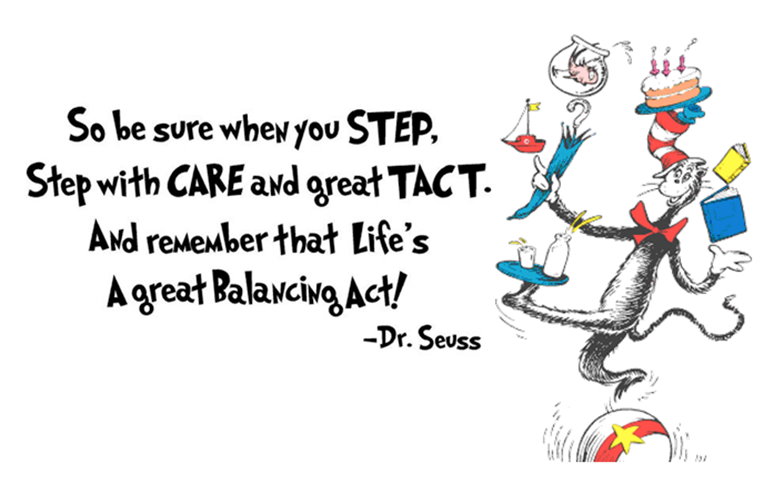
When we feel stressed, anxious, and overwhelmed, we may say that our life is “out of balance.” And considering the drastic changes we’ve all faced due to the coronavirus – with shelter-in-place for most of us, schools shutting down and going online, working from home or our jobs being affected – we likely feel out of our element and out of balance.
Importance of life balance
We need to remember that maintaining balance in our lives is ongoing, and it’s a significant part of being resilient and staying healthy!
“So be sure when you step, step with care and great tact. And remember that life’s A Great Balancing Act.”
– Dr. Seuss
So, how can we maintain balance in a time of uncertainty, when our world has turned upside down? Try these ideas.
Differentiate our responsibilities from our activities
Here’s something you can do as a family. Say, “I know we’ve all had our worlds changed due to the coronavirus, and I’d like us to think about how we can bring balance into our lives.” Print out the My Responsibilities vs. Activities sheet. Have each family member fill in their categories. (Have younger children write words or draw pictures.)
When everyone’s done, take a few minutes to review. Are there responsibilities or activities that you all share? Are there things you’re doing too much of, making you feel “unbalanced”?
Next, have each person circle the items they’d like to have more of in their life. And, lastly, write down and share with each other one thing you can change that would make you feel more balanced.
Name what’s overwhelming
When we’re feeling out of balance we might say “I feel overwhelmed!” or “I feel stressed!” But pinpointing exactly why we feel overwhelmed is important. For example, your child may say “school is stressing me out!” But if you dig deeper, you might find it’s a specific assignment they’re struggling with. From there, you can break down the assignment into smaller steps, or help your child get clarification from the teacher, or connect to a classmate. Naming what’s overwhelming gives us power to come up with solutions.
Avoid multitasking
Many people (especially teenagers!) think they are master multitaskers. But this is a myth: humans are not good at multitasking! The human brain has only so much working memory and isn’t more productive or efficient when pulled in different directions (Time, 2017).
The best advice: Focus on doing one thing at a time. Set yourself and your family up for success by avoiding distractions. Encourage your kids to not have to have their phone open, toggle between things on their laptop, or watch TV while doing school work.
Limit screen time
You’re probably thinking “thank goodness!” for services like streaming TV or Netflix as many of us are following shelter-in-place. But, considering we’re home so much, our screen time has also skyrocketed. Just because media is available doesn’t mean we need to turn it on!
To ease away from screen time, try to incorporate a daily “digital detox” for you and your family. This is a “screen-free” time (no phones included)! Perhaps your family schedules a daily reading hour, a board game night, or “meal Mondays” where you all cook a meal together. If managing screen time is a struggle for your family, check out Apple’s Screen Time settings or apps such as Moment or Screen Time Control: ZenScreen, which tracks time, blocks content, and provides suggestions like taking a (screen-free) break!
Kelly Mendoza is Senior Director, Education Programs at Common Sense Education where she oversees education programming and content strategy, including the Digital Citizenship Curriculum, interactive games, and online professional development for schools. She has developed research-based curricula in digital citizenship, media literacy, information literacy, and social-emotional learning (SEL). She develops programs that help students and schools create a positive culture around learning and technology. She has also developed educational resources and curriculum for Lucas Learning, the Media Education Lab, and PBS Frontline. Kelly has a PhD in Media & Communication from Temple University. Follow her on Twitter: @kellymendoza
Categorized as: Tips for Teachers and Classroom Resources
Tagged as: Toolkit: Maintain Balance, Trauma and Resilience
